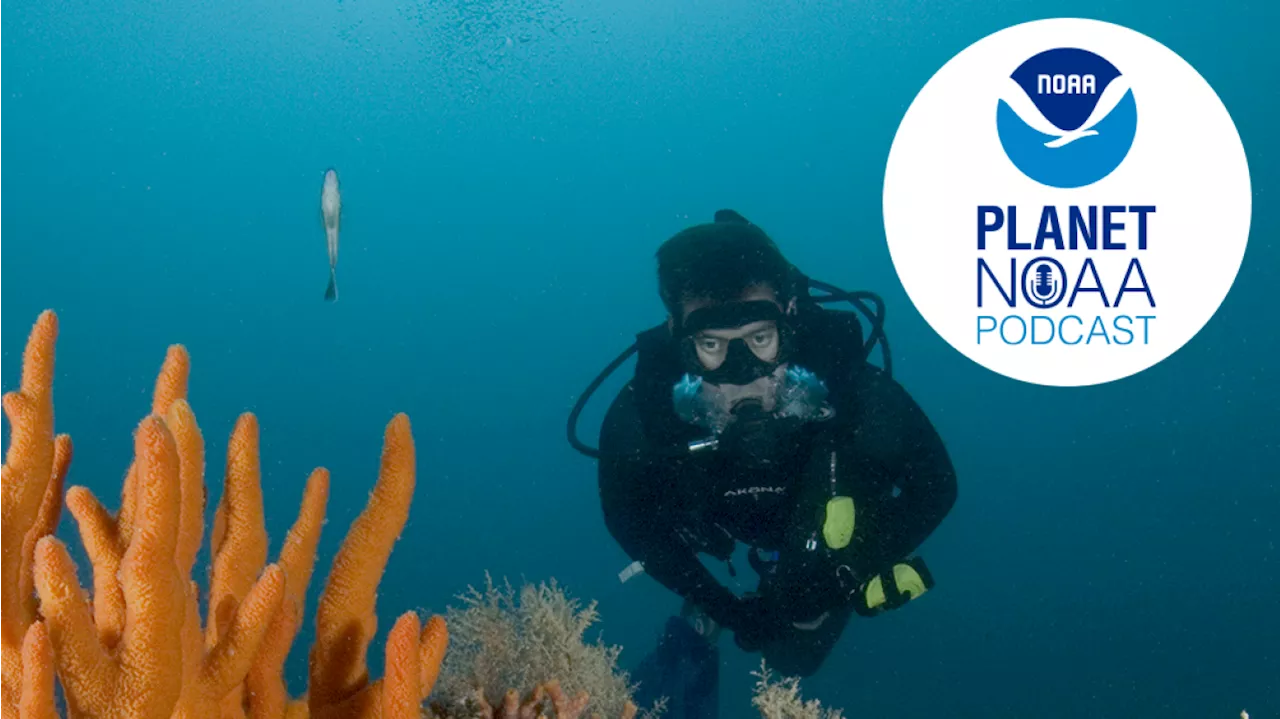Follow the journey of marine specimens from the seafloor to the museum floor with zoologist and curator Allen Collins. A NOAA employee makes a surprise discovery in a record store.
SARAH JESTER : Welcome back to the Planet NOAA Podcast. I’m your host, Sarah Jester. Today, we’ll follow the journey of marine specimens from the ocean floor to the museum floor with NOAA expert Allen Collins. But first, let’s solve the mystery of coral development.. Alexander Agassiz had set out to avenge his father, Louis Agassiz, who had lost more than one scientific and philosophical battle to Charles Darwin.
. The scientists discovered that the reef had been growing since the Eocene period and had been developing upward on top of the volcano in the area, which was subsiding into the ocean over time. COLLINS: So I started as a paleobiologist, and once I entered my Ph.D. program, my focus was on the very earliest animal fossils. So, I was very interested in the dawn of animal life and how animals came to be. And during that time period was when people started using genetic data to understand the evolutionary relationships between groups. And the first groups that diverge within the animal tree are the jellies and the sponges.
COLLINS: We were investigating how some seamounts off the coast of Alaska were impacting the pelagic diversity. So that is the diversity that lives in the water column. The waters of the northern Gulf of Alaska are extremely rich, and they support very large fisheries. So they're extremely economically important. There's a lot of connections between organisms that live on the bottom and then organisms that are swimming around.
to try to understand what was in there. One big part was basically left to the zoologists to go through to pull out organisms of interest. And basically for me, that would involve finding all the jellies, making sure that we collected several different exemplars of any given species, or what we call a morphotype. If we're not exactly sure what species it is, we try to get, “the little yellow jelly that looks like X,” and we call that a morphotype.
HOST: That’s pretty incredible; definitely a once-in-a-lifetime experience. I want to talk a little bit about the actual journey that these specimens take from the ship to the actual museum lab. What are some of the steps that kind of have to occur in between that initial collection and their arrival at the museum?, we start storing them. And so they become actually like a little mini collection; a bunch of jars lined up.
Our planet is 70% covered by ocean, and we've only mapped slightly more than a quarter of that at high resolution. We've only physically explored around 5% of that total body of water HOST: You're painting a beautiful picture of the The Life Aquatic with Steve Zissou for me. I don't know if you're a fan, but…HOST: Surprisingly, Wes Anderson is going to help me with this segue. A lot of The Life Aquatic deals with scientific legacy, as Bill Murray’s character is kind of examining his own life’s work and looking ahead to the future.
HOST: Audiophile reporting for duty. You got it. A couple months ago, I was over at Som Records in Washington, D.C., and I was chatting a little bit with the owner becausewinter storm warnings, announcements vinyl. And we've got the record here. It's in a plain black dust sleeve, which is a little bit worn. The center label reads Winter Storms Announcements, and it also contains a pretty standard tracklist with different winter storm PSAs.
United States Latest News, United States Headlines
Similar News:You can also read news stories similar to this one that we have collected from other news sources.
 Planet NOAA Podcast Episode 11: Close-up on coralsGet up close with coral reefs with expert Brian Beck. Plus, an early philosophical spat kicks modern coral research into high gear.
Planet NOAA Podcast Episode 11: Close-up on coralsGet up close with coral reefs with expert Brian Beck. Plus, an early philosophical spat kicks modern coral research into high gear.
Read more »
 Mega City Comics Bought by Forbidden Planet, Becomes Forbidden Planet CamdenAfter 44 years, Mega City Comics in Camden, London, will continue under new ownership, becoming Forbidden Planet Camden. The iconic comic book store, known for its long history and loyal customer base, was purchased by Forbidden Planet, a leading retailer of science fiction, fantasy, and cult entertainment. Forbidden Planet Camden will retain its original location and signage, with the existing staff continuing to serve customers.
Mega City Comics Bought by Forbidden Planet, Becomes Forbidden Planet CamdenAfter 44 years, Mega City Comics in Camden, London, will continue under new ownership, becoming Forbidden Planet Camden. The iconic comic book store, known for its long history and loyal customer base, was purchased by Forbidden Planet, a leading retailer of science fiction, fantasy, and cult entertainment. Forbidden Planet Camden will retain its original location and signage, with the existing staff continuing to serve customers.
Read more »
 A Compass Works Differently in Space, Varying Widely From Planet to PlanetHow does a compass work in space? From the moon to Venus, here’s how a compass would work beyond Earth’s magnetic field.
A Compass Works Differently in Space, Varying Widely From Planet to PlanetHow does a compass work in space? From the moon to Venus, here’s how a compass would work beyond Earth’s magnetic field.
Read more »
 ‘Severance’ Episode 4: The Tallest Waterfall on the PlanetThe show drops what may be the highlight of its already great second season: an innie field trip to the outside world. Read Alan Sepinwall's recap.
‘Severance’ Episode 4: The Tallest Waterfall on the PlanetThe show drops what may be the highlight of its already great second season: an innie field trip to the outside world. Read Alan Sepinwall's recap.
Read more »
 This Week In Space podcast: Episode 147 — Not As They SeemSpace.com is the premier source of space exploration, innovation and astronomy news, chronicling (and celebrating) humanity's ongoing expansion across the final frontier. Originally founded in 1999, Space.com is, and always has been, the passion of writers and editors who are space fans and also trained journalists.
This Week In Space podcast: Episode 147 — Not As They SeemSpace.com is the premier source of space exploration, innovation and astronomy news, chronicling (and celebrating) humanity's ongoing expansion across the final frontier. Originally founded in 1999, Space.com is, and always has been, the passion of writers and editors who are space fans and also trained journalists.
Read more »
 This Week In Space podcast: Episode 146 — All the Way With USRASpace.com is the premier source of space exploration, innovation and astronomy news, chronicling (and celebrating) humanity's ongoing expansion across the final frontier. Originally founded in 1999, Space.com is, and always has been, the passion of writers and editors who are space fans and also trained journalists.
This Week In Space podcast: Episode 146 — All the Way With USRASpace.com is the premier source of space exploration, innovation and astronomy news, chronicling (and celebrating) humanity's ongoing expansion across the final frontier. Originally founded in 1999, Space.com is, and always has been, the passion of writers and editors who are space fans and also trained journalists.
Read more »
